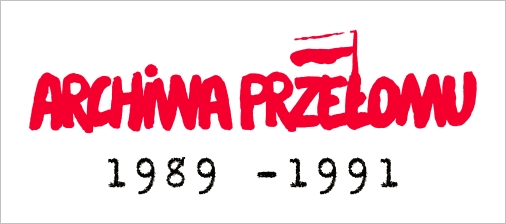The Archives of Transition 1989-1991 is a project coordinated by the Chancellery of the President of the Republic of Poland and the Chancellery of the Senate of the Republic of Poland since 2009. Its creation has been linked to the rising interest in modern Polish history, especially in the period of late socialism and transformation to liberal democracy in 1989-1991. The Archives of Transition started to manage rich, but dispersed and chaotic content of the Archives of the Chancellery of the President and the Chancellery of the Senate. After organising the archival materials, the staff of the Archives of Transition has been concentrating on networking with other institutions, acquiring new materials and using them to disseminate and promote the knowledge about the 1980s and 1990s among wider public.
A significant part of the Archives of Transition comes from the Chancellery of the Polish Senate, an archive with a very interesting provenance. As the Senate in Poland was annihilated after World War II, with its reinstatement in 1989 it was forced to build from the scratch its identity, documentation, and the modes of functioning. Former democratic opposition figures who became politicians after 1989, such as Bogdan Borusewicz, Henryk Wujec or Lech Kozioł, gradually donated their private archives to the Chancellery of Senate. The Chancellery also came into possession of the dispersed and neglected legacy of the Citizens' Parliamentary Club (Obywatelski Klub Parlamentarny) and the Civic Committees from the Mazovia region (the latter coincidentally found in Sobańscy Palace in Warsaw).
First activities aiming at classifying and digitalising the content of the Archives of the Chancellery of Polish Senate (so that they could be used by a wider circle of researchers) took place in years 2009-2010. This was the moment when the employees of the Senate’s Archives started to think about creating a separate, coherent entity concentrated solely on the period of the transition. This collection was supposed to be easily researchable and accessible to the amateur historians. The Chancellery of Senate initiated talks with the Chancellery of the President of Poland, which resulted in signing the agreement on mutual cooperation in 2013. Since 2010, the managing partners of the Archives of Transition invested in digital tools facilitating the digitalisation and dissemination of the content of the collection. The software such as ZEUS (database), HERMES (user’s application to catalogue materials) or AFRODYTA (guide to collection’s content) were acquired.
The creation of the the Archives of Transition is linked to the rising interest in modern Polish history, especially in the period of late socialism and the transformation to liberal democracy in 1989-1991. This interest started approximately in 2009, when the twentieth anniversary of the partly-free elections in Poland was widely celebrated by the Polish government and the public institutions. The uniqueness of the Archives of Transition lays in the fact that it contains private archives of ex-opposition leaders who entered the official politics after 1989 as the members of the parliament. The Archives of Transition witnesses the process of introducing the former dissidents into public service and the governing bodies. It also shows the history of the democratic opposition movement outside big metropolises such as Warsaw, Gdansk or Wroclaw. In the Archives one can find internal bulletins, protocols from discussions with the Party officials, and reports from preparations to 1989 elections in small and medium cities. Similarly, part of the archives represents the struggles of the new political elites to manage the rapidly changing situation in Polish society, politics and economy. As the title of the collection suggests, main topic of the Archives' interest is the transformation from socialist to liberal system.
The team managing the Archives of Transition strives to attract the interest not only of the professional researchers, sociologists, and historians, but also of the wider public, such as students, teachers, and pupils. They developed a rich website and invested in the computer tools and applications, in order to facilitate the usage of the different sources of material.
The Archives of Transition 1989-1991 try to show the variety of the values, strategies, decisions, and stances taken by the opposition leaders in the ending days of the Polish communist system and after its collapse.

